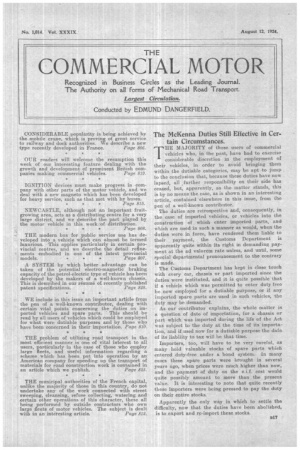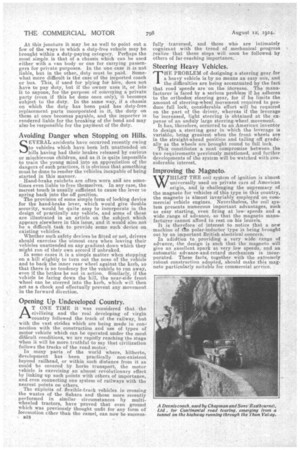The McKenna Duties Still Effective in Certain Circumstances. The McKenna Duties Still Effective in Certain Circumstances.
Page 1

Page 2

If you've noticed an error in this article please click here to report it so we can fix it.
THE MAJORITY of those users of commercial vehicles who, in the past, have had to exercise considerable discretion in the employment of their vehicles, in order to avoid bringing them. within the dutiable categories, may be apt to jump to the conclusion that, because these duties have now lapsed, all further responsibility on their side has ceased, but, apparently, as the matter stands, this is by no means the case, as is shown in an interesting article, contained elsewhere in this issue, from the pen of a well-known contributor.
The duties are retrospective and, consequently, in the case of imported vehicles, or vehicles into the construction of which enter imported parts, and which are used in such a manner as would, when the duties were in force, have rendered them liable to their payment, the Customs Department is apparently quite within its right in demanding payment at the ad valorem rate unless, and until, some special departmental pronouncement to the contrary is made.
The Customs Department has kept in close touch with every car, chassis or part imported since the duties were instituted, and it is quite possible that if a vehicle which was -permitted to enter duty free be now employed for a dutiable purpose, or if any imported spare parts are used in such vehicles, the duty may be demanded.
As our contributor explains, the whole matter is a question of date of importation, for a chassis or part which was imported during the life of the Act was subject to the duty at the time of its importation, and if used now for a dutiable purpose the date of its liability to tax will be that time.
Importers, too, will have to be very careful, as many hold valuable stocks of .spare parts which entered duty-free under a bond system. In many cases these spare parts were brought in several years ago, when prices were much higher than now, and the payment of duty on the c.i.f. cost would quite possibly amount to more than the present value. It is interesting to note that quite recently these importers were being pressed to pay the duty on their entire stocks.
Apparently the only way in which to settle the difficulty, now that the duties have been abolished, is to export and re-import these stocks. At this juncture it may be as well to point out a few of the ways in which a duty-free vehicle may be brought within a duty-paying category. Perhaps the most simple is that of a chassis which can be usect either with a van body or one for carrying passengers for private purposes. In the one case it is not liable, but in the other, .duty must he paid. Somewhat more difficult is the case of the imported coach or bus. This, if used for plying for hire, does not have to pay duty, but if the owner uses it, or lets it to anyone, for the purpose of conveying a private party (even if this be done once only), it becomes subject to the duty. In the same way, if a chassis on which the duty has been paid has duty-free replacement parts incorporated in it, the duty on these at once becomes payable, and the importer is rendered liable for the breaking of the bond and may also be responsible for the payment of the duty.
Avoiding Danger when Stopping on Hills.
SEVERAL accidents have occurred recently owing to vehicles which have been left unattended on hills having had their brakes released by curious or mischievous children, and as it is quite impossible to train the young mind into an appreciation of the dangers of such practices, it is obvious that something must be done to render the vehicles incapable of being started in this manner.
Hand-brake ratchets are often worn and are sometimes even liable to free themselves. In any case, the merest touch is usually sufficient to cause the lever to spring back into the off position. The provision of some simple form of locking device for the hand-brake lever, which would give double security, would be quite easy to incorporate in the design of practically any vehicle, and some of these are illustrated in an article on the subject which appears elsewhere in this issue, and it would also not be a difficult task to provide some such -device on existing vehicles.
Whether such safety devices he fitted or not, drivers should exercise the utmost care when leaving their vehicles unattended on any gradient down which they might run of their own accord if unlaraked.
In some cases it is a simple matter when stopping on a hill slightly to turn out the nose of the vehicle and to back the inner rear wheel against the kerb, EO that there is no tendency for the vehicle to run away, even if the brakes be not in action. Similarly, if the vehicle be facing down the hill, the near-side front wheel can be steered into the kerb, which will then .act as a check and effectually prevent any movement in the forward direction.
Opening Up Undeveloped Country.
AT ONE TIME it was considered that the
• civilizing and the real developing of virgin • i.country followed the track of the railway, but with the vast strides which are being made in eon-: nection with the construction and use of types of motor vehicle which can be operated under the most difficult conditions, we are rapidly reaching the stage when it will he more truthful to say that civilization follows the tracks of the road motor.
In many parts of the world where, hitherto, development has been practically non-existent beyond railhead, or within such distance from it as could be covered by horse transport, the motor vehicle is exercising an almost revolutionary effect by linking up such points with others of importance, and even connecting one system of railways with the nearest points on others.
The exploits of ilexible-track vehicles in crossing the wastes of the Sahara and those more recently performed in similar eircurnstanees by multiwheeled tractors, have proved that even ground which was previously thought unfit for any form of locomotion other than the camel, can now be success life fully traversed, and those who are intimately cognizant with the trend of mechanical progress realize ' that these steps will soon be followed by others of far-reaching importance.
Steering Heavy Vehicles.
THE PROBLEM of designing a steering gear for a heavy vehicle is by no means an easy one, and the difficulties are being accentuated by the fact that read speeds are on the increase. The manufacturer is faced by a serious problem if he adheres to the orthodox steering gear, for if he limits the amount of steering-wheel movement required to produce full lock, considerable effort will be required on the part of the driver, whereas if the leverage be increased, light steering is obtained at the expense of an unduly large steering-wheel movement. It has, therefore, occurred to an American inventor to design a. steering gear in which the leverage is variable, being greatest when the front wheels are in the straight-ahead position and tailing off gradually as the wheels are brought round to full lock.
This constitutes a neat compromise between the two requirements previously mentioned, and further developments of the system will be watched with considerable interest.
Improving the Magneto.
HILST THE coil system of ignition is almost universally used on private cars of American origin, and is challenging the supremacy of the magneto for vehicles of this type in this country, the magneto is almost invariably employed on commercial vehicle engines. Nevertheless, the coil system presents numerous important advantages, such as easy starting, even ring at low, speeds and a wide range of advance, so that the magneto manufacturer cannot afford to rest on his laurels.
it is therefore of interest to notice that a new machine of fte polar-inductor type is being brought out by an important British electrical concern. In adidtion to providing a very wide range of advance, the design is such that the magneto will give an excellent spark at very low speeds, and an automatic advance-and-retard mechanism is incorporated. These facts, together with the extremely robust construction adopted, should make this magneto particularly suitable for commercial service.
































